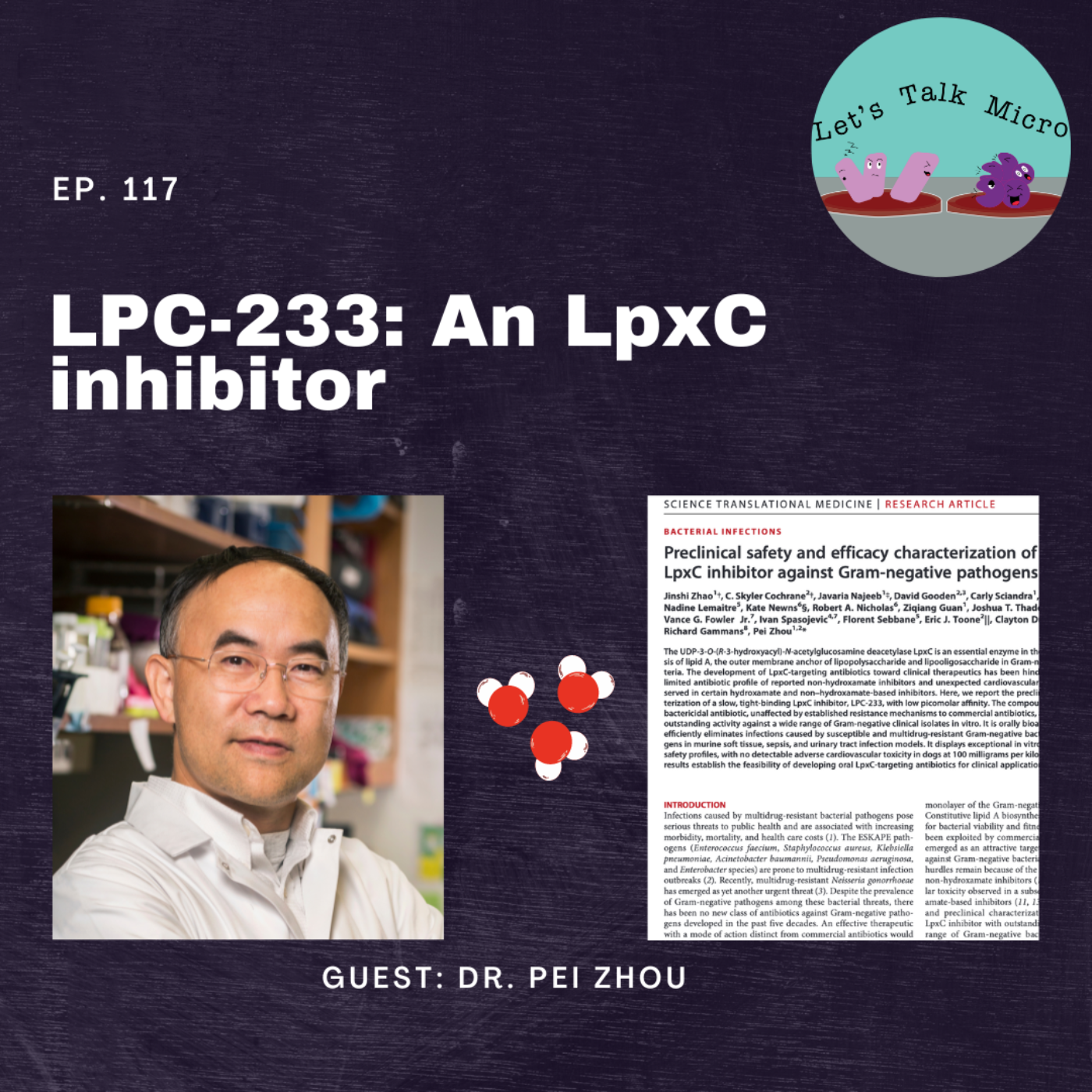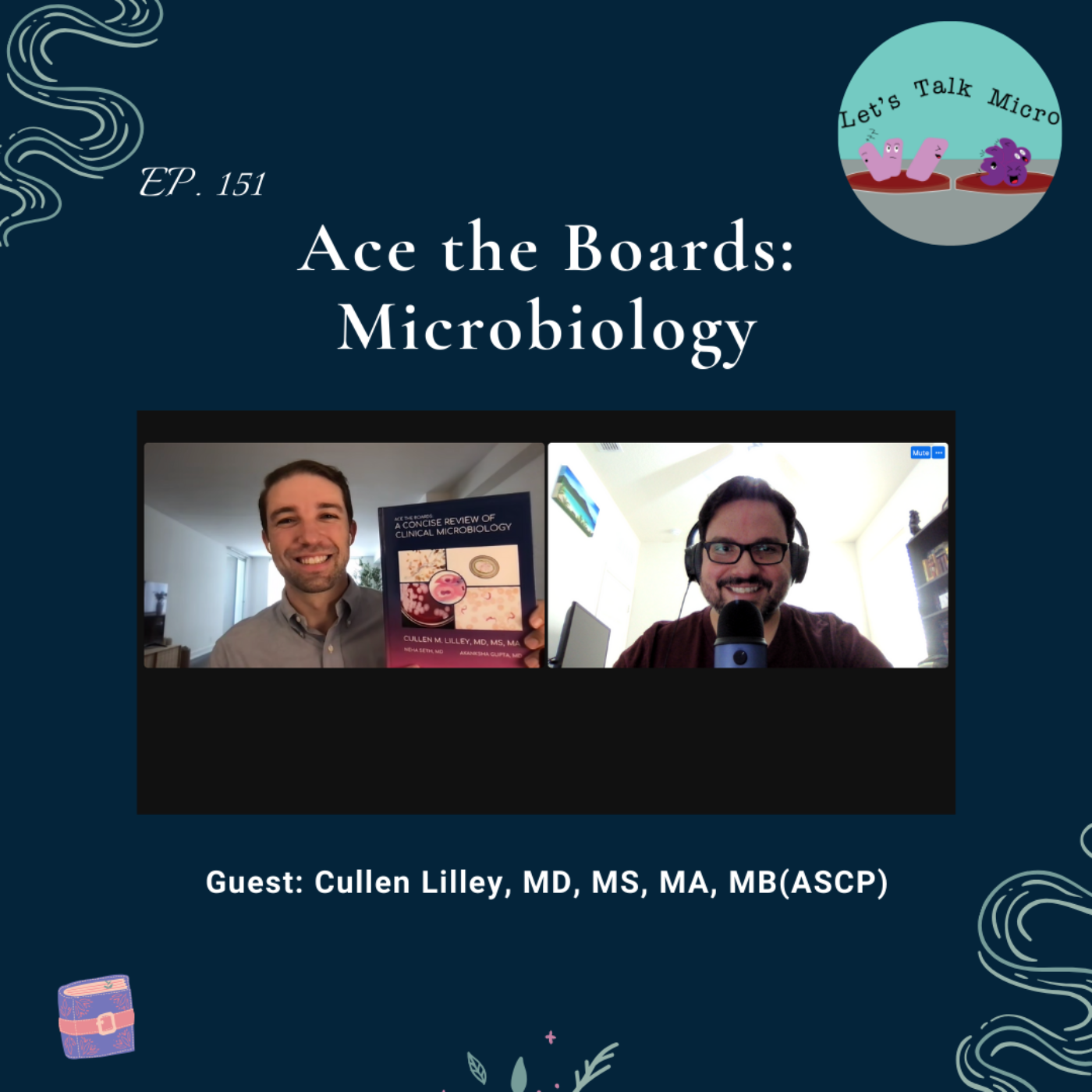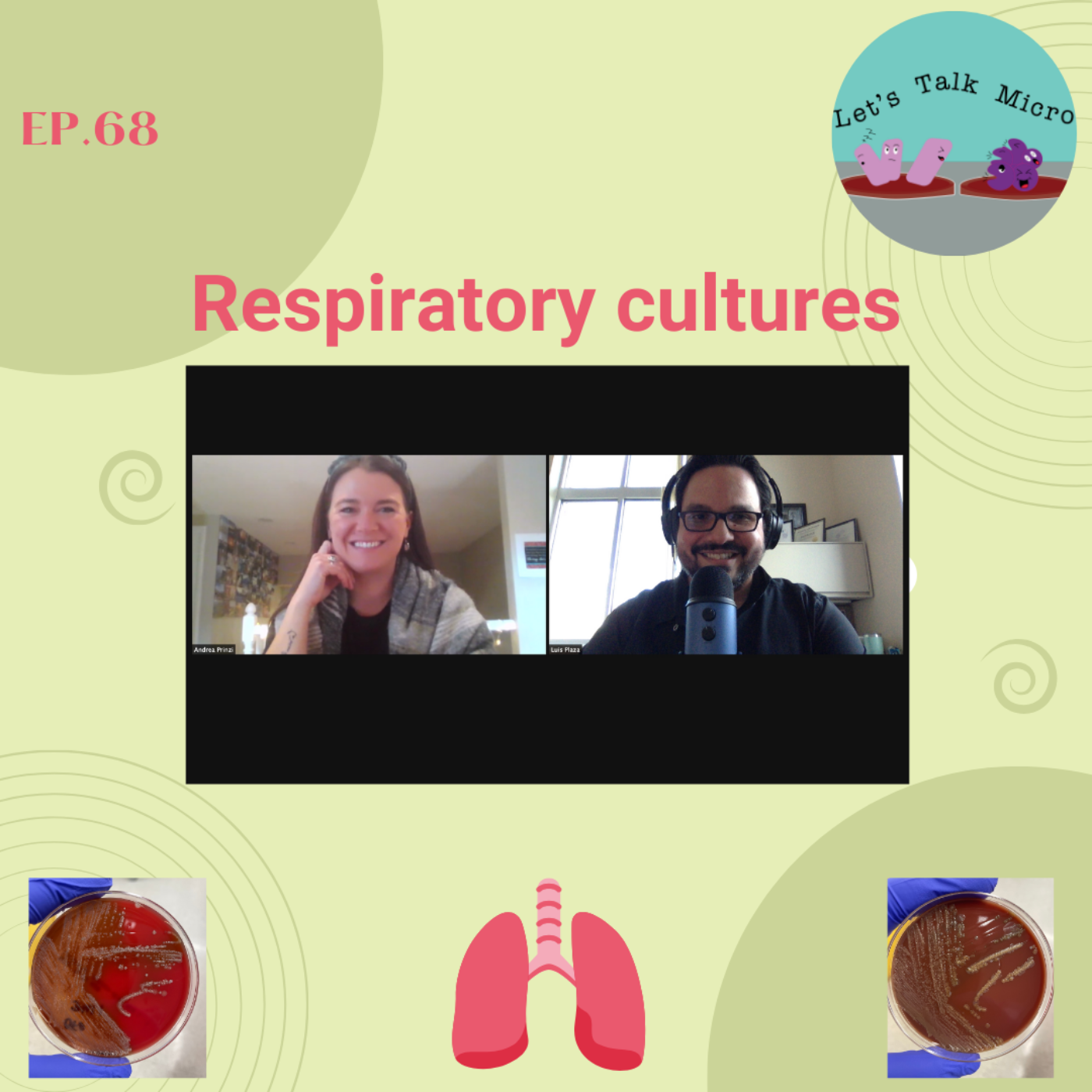Discover Let's Talk Micro
Let's Talk Micro

Let's Talk Micro
Author: Luis Plaza
Subscribed: 99Played: 1,764Subscribe
Share
© Luis Plaza 2021
Description
A Microbiology podcast where clinical microbiology is explained in simple terms, suitable for students and microbiologists alike. Let's Talk Micro has content about organisms, reactions, infectious diseases, and more. Hosted by Luis Plaza, a Medical Laboratory Scientist and microbiologist, who also shares his experiences in the field.
171 Episodes
Reverse
En este episodio en español, Luis conversa con la Dra. Verónica Seija. La Dra. Seija es especialista en microbiología y tiene un blog, redes sociales y un podcast donde habla sobre microbiología bajo el nombre MicroClinUY. ¿ Qué motivó a la Dra. a comenzar a hablar sobre microbiología? ¿Qué tipo de contenido encontramos en sus redes sociales y el podcast? ¿Dónde encuentran el podcast? Sintonizen y no se pierdan de una gran conversación. Enlace al podcast: https://www.microclin.uy/podcastEnlace a la página web de MicroClinUy: https://www.microclin.uyPreguntas? Comentarios? Envíen un correo electrónico a letstalkmicro@outlook.comDesean apoyar al podcast? Pueden hacerlo de la siguiente forma:Venmo: https://venmo.com/u/letstalkmicroBuy me a Ko-fi: https://ko-fi.com/letstalkmicro
Luis and Andrea return with a new episode of the AMR series. This time, they are joined by Dr. Nikunj Vyas, and they go over glycopeptides. Whether you are a microbiologist, provider or an ID pharmacist, you are familiar with vancomycin. What is the mechanism of action of glycopeptides? Is there intrinsic resistance? How does a difference in minimum inhibitory concentration (MIC) affect treatment? Tune in to learn more. Questions? Feedback? Send those to letstalkmicro@outlook.comWant to support the podcast? Here's how:Venmo: https://venmo.com/u/letstalkmicroBuy me a Ko-fi: https://ko-fi.com/letstalkmicro
Throwback to a great episode! Have you worked in a veterinary laboratory? What kind of training do you need? Are you able to work in one as an MLS? Have you thought about what a culture from a veterinary specimen might look like? How do you work those up? What about antimicrobials and guidelines? Kelli Maddock and Sarah Gefroh from the North Dakota State University Veterinary Diagnostic Laboratory join the podcast to answer these questions. They are Medical Laboratory Scientists with experience in human medicine who switched to veterinary medicine.Questions? Feedback? Send those to letstalkmicro@outlook.comWant to support the podcast? Here's how:Venmo: https://venmo.com/u/letstalkmicroBuy me a Ko-fi: https://ko-fi.com/letstalkmicro
One of the first episodes published and one of the most downloaded episodes. In it Luis goes over catalase and coagulase. What are biochemicals? How are they useful in the identification of bacteria? In this episode I start going over biochemicals: catalase and coagulase, two of the most commonly used biochemicals in Clinical Microbiology.Questions? Feedback? Send those to letstalkmicro@outlook.comWant to support the podcast? Here's how:Venmo: https://venmo.com/u/letstalkmicroBuy me a Ko-fi: https://ko-fi.com/letstalkmicro
The first episode! Share it with students and peers, In it Luis talks about agar. What is agar? What do we use it for? Various types of agar are discussed like blood agar and MacConkey along with their uses.Questions? Feedback? Send those to letstalkmicro@outlook.comWant to support the podcast? Here's how:Venmo: https://venmo.com/u/letstalkmicroBuy me a Ko-fi: https://ko-fi.com/letstalkmicro
A microbicide for Neisseria gonorrhoeae? In this episode Luis is joined by Dr. María Rendón from the University of Arizona. Dr. Rendón joins the podcast to talk about a novel microbicide that was developed which has activity against N. gonorrhoeae . How does it work? Does it affect commensal Neisseria? What about methylation signatures? Tune in to learn more about this microbicide.Link to articles referenced in episode:http://microbialcell.com/researcharticles/2019a-so-microbial-cell/https://www.cell.com/action/showPdf?pii=S1931-3128%2819%2930347-6Link to study: https://journals.asm.org/doi/abs/10.1128/aac.00794-24?doi=10.1128/aac.00794-24Questions? Feedback? Send those to letstalkmicro@outlook.comWant to support the podcast? Here's how:Venmo: https://venmo.com/u/letstalkmicroBuy me a Ko-fi: https://ko-fi.com/letstalkmicro
Are you familiar with the BioFire system? If you work in microbiology you probably are. How about a joint infections panel for this system? In this episode Dr. Angelica Moran and Jekzaly Arellano join the podcast to talk about a study they did evaluating this panel. Why are joint infections difficult to diagnose? Tune in to learn more.Link to article: https://journals.asm.org/doi/10.1128/jcm.00182-24Questions? Feedback? Send those to letstalkmicro@outlook.comWant to support the podcast? Here's how:Venmo: https://venmo.com/u/letstalkmicroBuy me a Ko-fi: https://ko-fi.com/letstalkmicro
This week Luis continues going over gram-positive rods: this time Lactobacillus. What is the morphology of Lactobacillus? Biochemicals? Which species are typically seen in humans? Is it pathogenic or normal flora? What about susceptibilities? All great questions. Tune in to find out about this genera. Questions? Feedback? Send those to letstalkmicro@outlook.comWant to support the podcast? Here's how:Venmo: https://venmo.com/u/letstalkmicroBuy me a Ko-fi: https://ko-fi.com/letstalkmicro
If you work with MALDI-TOF MS and you read urine cultures, you probably have seen this organism : Actinotignum schaalii. Is this organism significant? What is the gram stain? Biochemicals? Other questions come up such as we do report it? Do we perform susceptibilities ? Tune in to learn about this emerging pathogen and get answers to all these questions.Questions? Feedback? Send those to letstalkmicro@outlook.comWant to support the podcast? Here's how:Venmo: https://venmo.com/u/letstalkmicroBuy me a Ko-fi: https://ko-fi.com/letstalkmicro
Those of you that work in the laboratory as Medical Laboratory Scientists know that you need to be certified. How can you get certified in microbiology? Even if you haven't completed a Medical Laboratory Sciences program, is there a way to get certified? In this episode Dr. Amanda Harrington joins Luis to answer questions regarding certification in Microbiology from the American Society for Clinical Pathology (ASCP), including information about the Specialist in Microbiology Certification.Link to certifications in Microbiology from ASCP: https://www.ascp.org/content/board-of-certification/get-credentialed?srsltid=AfmBOoo4i6_pt4DLUEKUJmclab7AJkFp1bZlPGibNnIqLb-jgp3JGgvO# Questions? Feedback? Send those to letstalkmicro@outlook.comWant to support the podcast? Here's how:Venmo: https://venmo.com/u/letstalkmicroBuy me a Ko-fi: https://ko-fi.com/letstalkmicro
Dr. Rodney Rohde returns to the podcast! This time he joins Luis to talk about dengue. You might hear reports about increases in cases in some areas, so it was a good time to talk about it. What is dengue? What type of virus it is? Vectors? Prevention? Is there a vaccine? Tune in to learn more about this virus.Link to Dr. Rohde's dengue article: https://asm.org/articles/2024/august/dengue-is-spreading-is-warmer-weather-to-blameMore information about dengue: https://www.cdc.gov/dengue/index.htmlLink to Dr. Rohde's Podcast: https://www.contagionlive.com/view/from-pathogen-to-infectious-disease-diagnosis-taking-on-potential-standard-of-care-diagnostic-opportunitiesQuestions? Feedback? Send those to letstalkmicro@outlook.comWant to support the podcast? Here's how:Venmo: https://venmo.com/u/letstalkmicroBuy me a Ko-fi: https://ko-fi.com/letstalkmicro
If you work in a clinical microbiology laboratory, you might have worked with bone and joint samples. In this episode we dive deeper into bone and joint infections. Luis is joined by Dr. Joan Gomez-Junyent, an Infectious Diseases physician at Hospital Del Mar in Barcelona, Spain. Dr. Gomez goes over different types of infections. What organisms are typically seen? Is there a typical treatment of choice? How about antimicrobial resistance? Tune in to hear Dr. Gomez go over these questions and more. Questions? Feedback? Send those to letstalkmicro@outlook.comWant to support the podcast? Here's how:Venmo: https://venmo.com/u/letstalkmicroBuy me a Ko-fi: https://ko-fi.com/letstalkmicro
Season 4 is here! Tune in for the first episode. Luis talks to Dr. Paul Hergenrother about lolamicin. Dr. Hergenrother is a Professor of Chemistry at the University of Illinois in Urnaba-Champaign. He was previously a guest in the podcast (fabimycin episode) and this time he returns to talk about another potential antibiotic candidate: lolamicin. What is lolamicin? What is the mechanism of action? What organisms does it have activity against? Does it affect the gut microbiota? Link to Dr. Hergenrother's article: https://www.nature.com/articles/s41586-024-07502-0Questions? Feedback? Send those to letstalkmicro@outlook.comWant to support the podcast? Here's how:Venmo: https://venmo.com/u/letstalkmicroBuy me a Ko-fi: https://ko-fi.com/letstalkmicro
Originally published in May 26, 2022, in this episode Luis continues going over beta hemolytic strep: this time Streptococcus anginosus group. What are the species that comprise this group? What is the Lancefield group? What about biochemicals and morphology? Have you heard of Streptococcus pseudoporcinus? Tune in to find out.Questions? Feedback? Send those to letstalkmicro@outlook.comWant to support the podcast? Here's how:Venmo: https://venmo.com/u/letstalkmicroBuy me a Ko-fi: https://ko-fi.com/letstalkmicro
Originally published in November 30 2023, in this episode, Dr. Pei Zhou from the Duke University School of Medicine joins the podcast and talks to Luis about LPC-233. This is a compound that shows bactericidal activity against some gram-negative rods. LPC-233 is an LpxC inhibitor. What is LpxC? How does LPC-233 works? What are some challenges of developing LpxC inhibitors? Tune in to find out.Link to article: https://doi.org/10.1126/scitranslmed.adf5668Questions? Feedback? Send those to letstalkmicro@outlook.comWant to support the podcast? Here's how:Venmo: https://venmo.com/u/letstalkmicroBuy me a Ko-fi: https://ko-fi.com/letstalkmicro
Originally published on October 13, 2022, in this episode Luis talks to Dr. Paul Hergenrother from the University of Illinois. Dr. Hergenrother talks about Fabimycin, an antibiotic candidate for gram negative bacteria. What is Fabimycin's mechanism of action? To which bacteria does it show activity against? Any intrinsic resistance? Tune in to find out.Link to article: https://pubs.acs.org/doi/10.1021/acscentsci.2c00598Questions? Feedback? Send those to letstalkmicro@outlook.comWant to support the podcast? Here's how:Venmo: https://venmo.com/u/letstalkmicroBuy me a Ko-fi: https://ko-fi.com/letstalkmicro
A great way to end season 3! In this episode Dr. Cullen Lilley talks to Luis about his textbook : A Concise Review of Clinical Microbiology . Dr. Lilley is a pathology resident, with a Microbiology background, and a Let's Talk Micro listener! Tune in to learn about what is in this microbiology textbook, what is Ace my Path, what are the roles of a pathologist and more.Link to Ace My Path: https://www.acemypath.comLink to textbook: https://a.co/d/gGDiZ8ZQuestions? Feedback? Send those to letstalkmicro@outlook.comWant to support the podcast? Here's how:Venmo: https://venmo.com/u/letstalkmicroBuy me a Ko-fi: https://ko-fi.com/letstalkmicro
In the laboratory we routinely use molecular testing to identify organisms in blood cultures. We also incubate body fluids in blood culture bottles. What if we could use those same tests to identify organisms from body fluids? In this episode Christina Cox and Joel Mortensen join the podcast to talk about this. They performed a study where they used the cobas® eplex system (GenMark) to identify organisms recovered from sterile body fluid cultures. Tune in to hear about the results and the applications of this in the clinical laboratory.Link to article: https://doi.org/10.1128/jcm.01611-23Questions? Feedback? Send those to letstalkmicro@outlook.comWant to support the podcast? Here's how:Venmo: https://venmo.com/u/letstalkmicroBuy me a Ko-fi: https://ko-fi.com/letstalkmicro
Throwback Thurdsday! This week shows an episode originally released in 2022 where Luis talks to Andrea Prinzi about respiratory cultures. What are the types of respiratory cultures? What are the pathogens? What is the significance of yeast in respiratory cultures? Sputum rejection? Tune in to this episode to learn more about these cultures.Link to article about sputum rejection that Dr. Prinzi mentions in the episode: https://journals.asm.org/doi/pdf/10.1128/jcm.16.4.627-631.1982Questions? Feedback? Send those to letstalkmicro@outlook.comWant to support the podcast? Here's how:Venmo: https://venmo.com/u/letstalkmicroBuy me a Ko-fi: https://ko-fi.com/letstalkmicro
In this episode Luis is joined by Dr. Crystal Icenhour to talk about the microbiome, more specifically, the human microbiome. What organisms typically make up the microbiome? Do they change between areas of the body? What are some applications for the microbiome? Tune in for another great episode. Questions? Feedback? Send those to letstalkmicro@outlook.comWant to support the podcast? Here's how:Venmo: https://venmo.com/u/letstalkmicroBuy me a Ko-fi: https://ko-fi.com/letstalkmicro
Top Podcasts
The Best New Comedy Podcast Right Now – June 2024The Best News Podcast Right Now – June 2024The Best New Business Podcast Right Now – June 2024The Best New Sports Podcast Right Now – June 2024The Best New True Crime Podcast Right Now – June 2024The Best New Joe Rogan Experience Podcast Right Now – June 20The Best New Dan Bongino Show Podcast Right Now – June 20The Best New Mark Levin Podcast – June 2024
 United States
United States























can you post the flow chart here also?